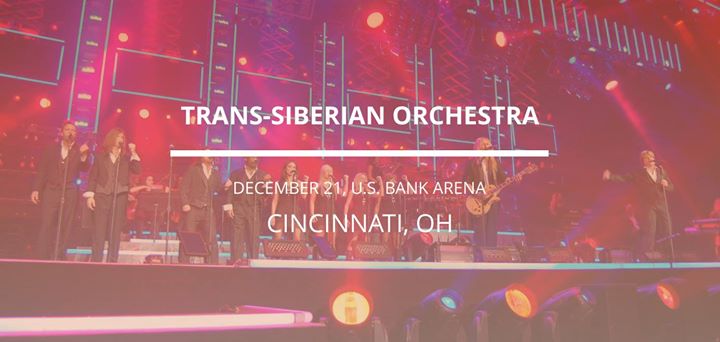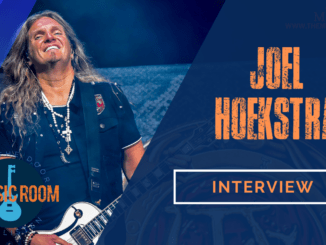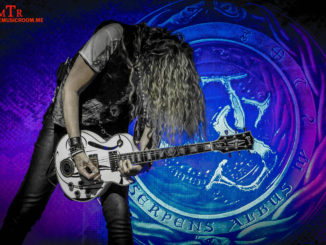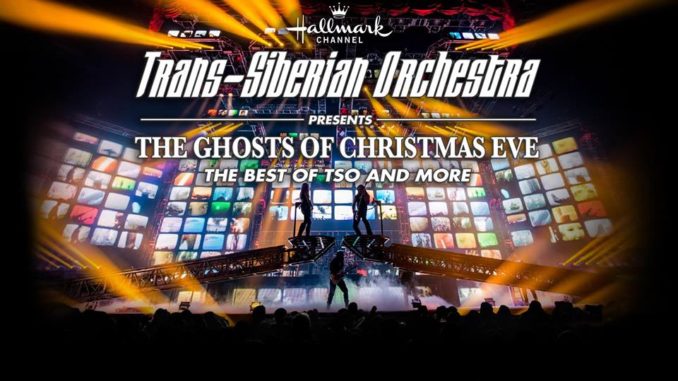
Operator: Thank you for joining us today for an interview with Trans-Siberian Orchestra Creator, Lyricist and Composer, Paul O’Neill to talk about Trans-Siberian Orchestra’s Winter Tour 2016: The Ghost of Christmas Eve…. We will now take our first question from Gary Graff with Billboard. Gary, please go ahead with your question.
Gary Graff: How you doing Paul?
Paul O’Neill: Doing great, Gary, good to hear your voice again.
Gary Graff: You too, you too. 20 years does it feel like—
Paul O’Neill: God, I know.
Gary Graff: Does it feel like 20 minutes, 20 seconds, 200 years.
Paul O’Neill: Honestly, it feels like 20 minutes. It’s just like we blink and two decades passed. Again, I would love to say that we planned for the Christmas trilogy to resonate like this, but it was just pure luck. Of course, we did everything backwards. Normally you have like five or six other platinum albums, then you take on Christmas. Of course, we took it on first and the rest of the year on later. It’s all worked out. The only problem is just (indiscernible) production that you have to change every year and take it to another level. It just becomes distracting because as I’m sure everybody on the phone here knows, in rock there’s a rhythm. You write an album no matter how long it takes. You record it no matter how long it takes and then you tour for one or two years, and then you start the whole pattern again. With the success of the winter tours basically every October we shut everything down and just start to put together this monstrous air carrier and take it out on the road. Then after New Year’s, sleep for a couple of days and then back in the studio.
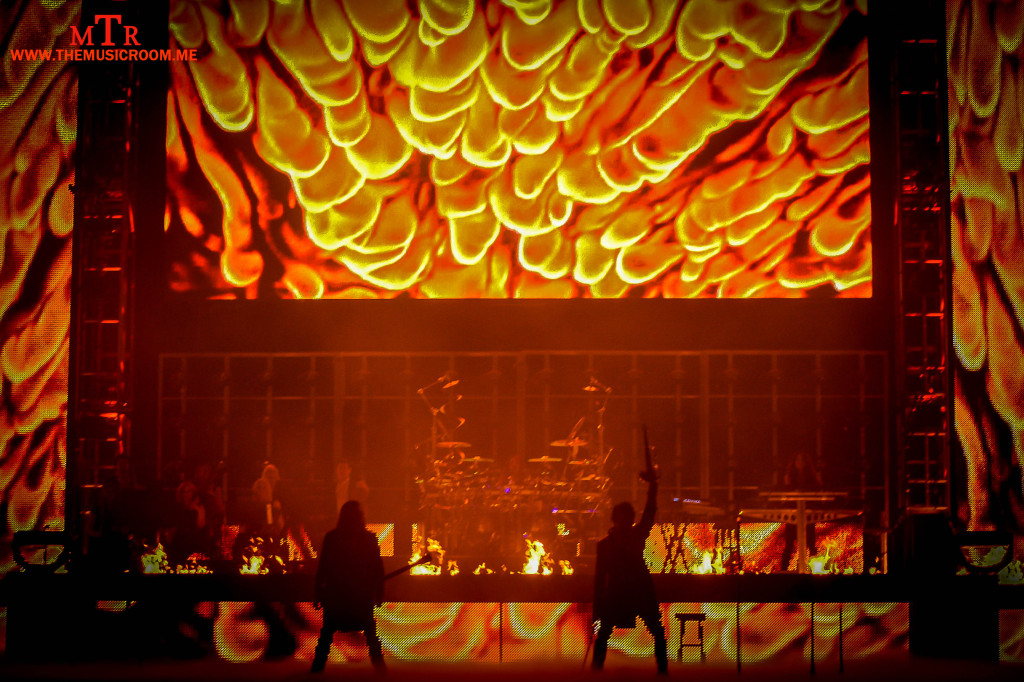
Gary Graff: Talk about doing, bringing the Ghost of Christmas Eve back for this year and as well as this new song that’s part of the package.
Paul O’Neill: It’s okay. The main thing was we never really ever intended to do The Ghost of Christmas Eve. As you know, it was a television special we did for Fox – who basically called us up one year and asked us to do Beethoven’s Last Night, for an hour. I asked “Why?” And they said, “Well, December 2nd we had a show drop out.” I said, “If you give me an hour I’ll give you a movie.” They said, “Do you have a script?” I said, “I’ll write it tonight.” We took it pretty simple, runaway from the Midwest comes to New York City, breaks into an old band in Vaudeville Theater. There she was discovered by the caretaker played by Ossie Davis who uses the ghost and the spirits of the band and theater to turn her life around. We were really lucky, because people like Jewel, and Michael Crawford joined us to play some of the ghosts. It was only supposed to run once and then run again, but it did so well for Fox they ran it multiple times. Then it took off in syndication and between public TV and all these different stations, it runs pretty much every year. After we’d done all three of the rock operas from the trilogy, a number of fans asked if we were ever going to do the television special. While it is a rock opera and we never considered it, but actually it offered us an interesting angle where basically, one of the things about TSO that we love to do is – to number one, blur the line between the band and the audience, make the audience really feel like they’re part of the show. Then the other thing is kind of reach generations. The one thing I love about music is that it can effortlessly jump all the silly walls people put between themselves, be it nationality, be it economics, and be it whatever. When it jumps a generational wall that feels the best. Last year when we were trying to figure out how we were going to put this on, we decided we would design the stage so that it looked like an old 1929, 1930 Loew’s or Fox movie palace. It would start with the curtains coming up and there you would see the legendary Ossie Davis who is no longer with us, but is in heaven somewhere. You kind of feel like you were in an old movie theater back in the 20s or the 30s. By the third song, “Wham”, the band is on the stage and you’re in the present. Basically, during the whole rock opera you’re going between the past. Again, people like Ossie Davis who are no longer with us, to the present the band on the stage. It’s kind of cool when you see like a teenager lean over to their parents and say, “Who is that guy?” They start to explain who Ossie Davis is and stuff like that. There’s something magical when you just see somebody loving it with a (indiscernible) thought but there’s a father and a teenage kid if you have both enjoying the same music. It’s the magic of music. Christmas, also of course, makes it a little bit easier. Last year was a big experiment. We weren’t sure if it was going to work, but it worked so well that we decided to do it again this year.
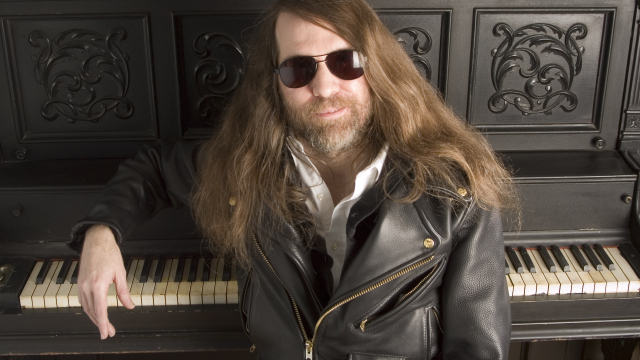
Operator: Thank you. Our next question comes from Allen Sculley with Last Word Features. Allen, go ahead with your question.
Paul O’Neill: Hey, Allen.
Allen Sculley: Hey, Paul, good to talk with you again. How you doing?
Paul O’Neill: Good to hear you, Al. Hanging in there because late night in the studio last night because everybody was watching the debates and then it got really … I’m a little horse, I apologize. Where should we start Allen?
Allen Sculley: Well, I thought I’d go back to last year’s teleconference. Back then we brought up the 20th Anniversary here of TSO. You were talking at that point that you thought you’d do a 20th Anniversary Tour and build it around Christmas Eve and other stories, the one that started it all. I’m curious how that thinking evolved over the course of the year and why you landed back on going with The Ghost of Christmas Eve this year?
Paul O’Neill: The amount of fan mail basically of people that loved it then asked if we were going to be doing it again. We exist for the fans. Two years in a row it really isn’t a lot when you consider we did Christmas Eve now for 13 years in a row. We kind of came to the decision that we were trying to shuffle them more just so again, never allow boredom to set in anyway, but it would be from the special effects on the flight deck to the story to the new singers, because we have a lot of new singers this year. This new young singer from Czech Republic (Editor’s note: should be Croatia), this guy’s got a great voice. Another guy from Sweden. This girl, Ashley Hollister I do believe is from Canada, (Editor’s note: Ashley is from NJ, Rosa Laricchiuta is from Canada) which is a separate country even though they don’t know it. (Editor’s note: Paul intends that Canada is always with us in a good friend & neighborly way) But anyway, that’s another story.
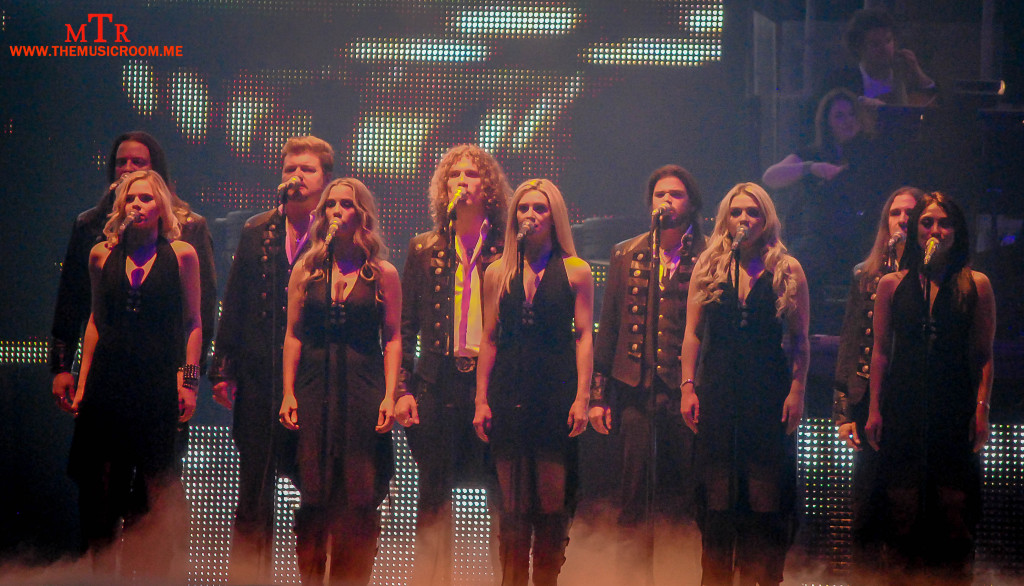
Operator: Thank you. Our next question comes from Suzanne Sproul with Southern California Newspaper Group. Suzanne you may go ahead with your question.
Suzanne Sproul: Thank you, hi Paul, first time here. I’m enjoying it. I really liked the Jerry angle. How do you, or why does the show donate to charities and how do you pick the ones that you do?
Paul O’Neill: Well, it’s a little bit complicated. When we started in the 70s, usually at the end of every year we would write a check to a charity that we thought did good work. Then one year our accountants audited the charity and found out something odd, it was 96 cents out of every dollar went to overhead, and 4 cents went to the needy. What was even scarier was that it was legal. When TSO started to tour, I think it was one of the agents said, “Paul, instead of writing one check at the end of the year, why don’t you write it and take $1 or $2 from every ticket that you sell and write it for a local charity. This way if you make a mistake it won’t be a total disaster.” I thought that was a great idea.
Then somebody said, “You know what? We should get the radio stations involved because they live in the cities, they’re in the trenches, they know the charities that are real, and they know the ones that are cons.” We started asking the radio stations what are the best charities? They always tend to be the same ones, Salvation Army, Make A Wish. I think the last time we did an audit, 97 cents out of every dollar went to the needy and 3 cents went to overhead. I’m sure you guys see it all the time, Wounded Warriors where there are people are just helping themselves to the till, or you see them sometimes robbing from orphanages and stuff like that. I don’t know if anybody remembers the Mother Hale House? Some of the guys know. She basically was this great woman in New York City who actually inspired me to write The Lost Christmas Eve. We were going to write on the back of that album say if you ever have five or ten extra dollars send it to Hale House because she was taking in all the crack babies that were being abandoned and taking care of them. After she passed away, other people took over, and thank God we found this out before we released the album, but basically $60 million was embezzled and then we took care of like four kids. We’ve been really lucky in life. God forbid if we ever got in trouble we hope somebody would help us. We can do it, it’s totally our pleasure. If you’re going through a rough time any time in life it’s bad, and during the holidays it’s even worse, and to date it’s just really worked out great.
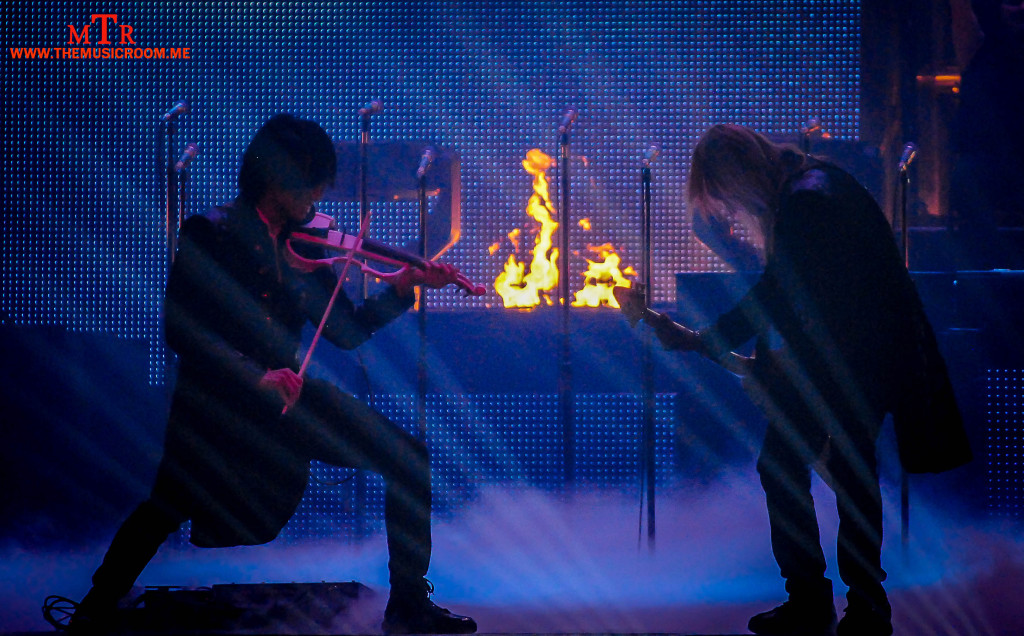
Operator: Thank you. Our next question comes from Jeff Niesel with Cleveland Scene. Jeff, you may go ahead with your question.
Jeff Niesel: Hey, Paul. Hi how’s it going? I was hoping you could talk a little bit about the technology, because it seems like every year you use some new cutting edge technology. What do you have on tap for this year?
Paul O’Neill: We always try to keep it secret so it’s always a surprise. You’re right about the technology. It has allowed us to do that. The show that we’re doing this year we couldn’t do five years ago. The show we were doing five years we couldn’t do five years before that. Technology has been moving in such leaps and bounds, and brings extra weight. It’s one of the reasons we were able to use the catwalk to connect the back and the front of the arena. The way the lights got so light, LEDs, it just gave us that extra maneuvering room. It also allowed us to save. These new LEDs are just so efficient the way they use power. We used to have carry two tractor trailers of generators because a lot of the buildings couldn’t handle our electrical poles. Two years ago, the lights got so efficient we were able to drop the generators which left more room for pyro.
Operator: Thank you. Our next question comes from Sharon Haddock with Deseret News. Sharon, you may go ahead with your question.
Sharon Haddock: Hi Paul, nice to talk with you again.
Paul O’Neill: Hi Sharon. It’s good to hear your voice.
Sharon Haddock: Doing well. I talked to you last during your interview for “Labyrinth.” Did that work for you? Did that album sell well? Did that concept work?
Paul O’Neill: It actually worked great and the main thing is we simply obviously have to take it out and tour it but we’ve been busy in the studio getting the next record done and also, there’s some people in rock, we (indiscernible) Broadway on for a long, long, long time. We have been in the studio recording our first Broadway musical also. Our biggest problem, Sharon, honestly is simply time. These days, it’s definitely going to go gold. All the albums always do. The main thing is just where to spend the time.
These days we have enough old timers in the band that they can mentor the new kids as they’re coming in, and which I’m praying will allow me more time to concentrate on Broadway in the near future.
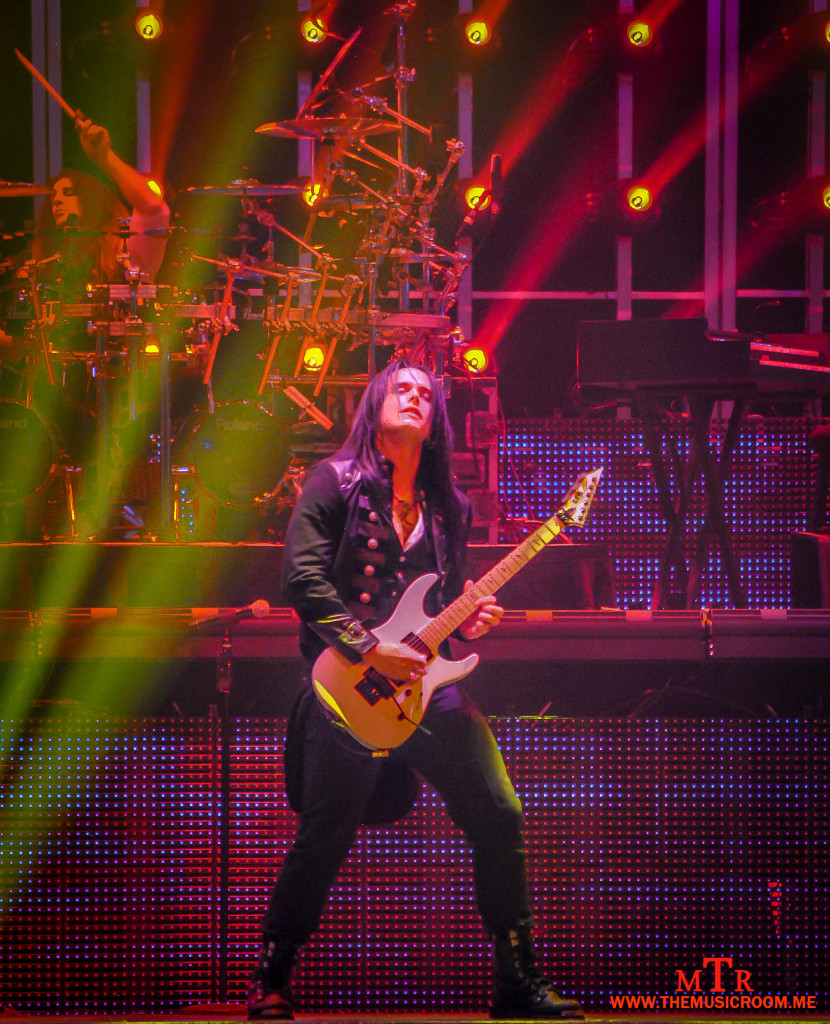
Operator: Thank you. Our next question comes from Kevin Coffey with Omaha World Herald. Kevin you may go ahead with your question.
Paul O’Neill: Hey Kevin, how you doing?
Kevin Coffey: I’m doing alright, Paul. It’s been awhile since I’ve seen, but one of the things you guys always do is come back here to Omaha to do a lot of rehearsals and stuff like that. One of the things I wondered was why do you keep coming back to town?
Paul O’Neill: Basically we don’t do any shake out shows where we go and play the tertiary market and work out the bugs in the show. The tour has to be perfect from show one which is basically means that we have to find an arena and rent it out for weeks. Unfortunately, a lot of times in the past we had to tear down because there was a basketball game or a hockey game. Omaha had a situation where it had multiple arenas and we were able to rent out the arena for weeks at a time without having to tear down. That was just such an advantage. The crew was ecstatic. The first year, it was a little strange because before that we always rehearsed in Omaha – I mean in Florida. Omaha has basically become the band’s second home.
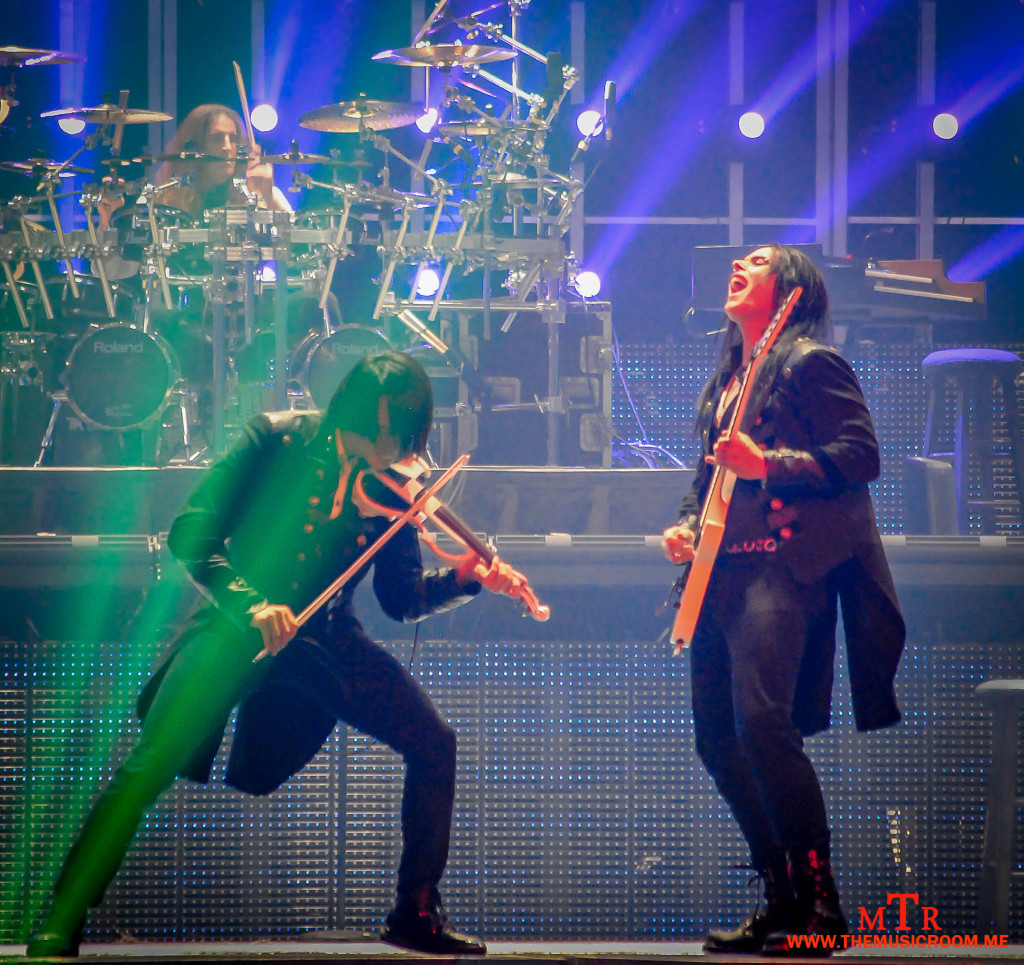
Operator: Thank you. Our next question comes Richard Duckett with Worcester Telegram and Gazette. Richard you may go ahead with your question.
Richard Duckett: Hi Paul.
Paul O’Neill: Hello, sir.
Richard Duckett: Hi, good, thanks. Going back to the technology just for a minute. How active are you personally in overseeing the special effects? Is it your vision or do you just give it final approval?
Paul O’Neill: Basically it was always part of the vision for Trans-Siberian Orchestra, the mixing classical with rock which I obviously got from bands like Emerson, Lake & Palmer. The rock opera aspect which I love because it gives a third dimension, which I plagiarized from The Who. The vision for them, always be cutting edge and make sure there’s no such thing as a bad seat. I got them employed because I saw Pink Floyd, I think it was in ’96 or ’95. The band was kind enough to give me front row seats and they blew my mind. I simply had never seen a show that good where every time you thought you saw the ultimate gag, they had ten more lined up. Professional curiosity I wonder what it looks like in the nose bleed. I went all the way back to the further seats in the back and it was just as good. It was different, it was more cinematic but with Pink Floyd I basically learned you can design a show, as long as you don’t care about the budget, where there is no such thing as a bad seat in the house. God bless Pink Floyd because they were doing it in the 90s. They didn’t have the advantage of all these computers, etc. Basically, every year we know all the pyro companies, we know all the lighting companies, we know all the special effects companies. They all know that if they invent great special effects that’s insanely expensive there is one band that is dumb enough to buy it and that’s us. It’s also always important for us that we get it right away when it first comes out because the disadvantage of that is that it’s incredibly expensive when it first comes out. The look on the kids’ faces when they see an effect that has never been done before, it’s just worth it. We do a lot of other silly things. One of the reasons we put the stage in the back of the arena is so that during the show there’s at least, there’s always going to be a point during the show where you’re like in the best place to see the show. I remember the first time we did it, the accountants going, “Paul, you can’t do this. You are killing seats. You are killing floor seats.” I’m like, “Yeah, but it looks really, really cool.” True story. The next day when I showed up at rehearsal the accountant bought T-shirts for all of the crew. In the front it just had a little TSO logo. On the back in big block letters it says, “JESUS SAVES, PAUL SPENDS.” Again, it’s just worth it and you see it and the audience is safe.
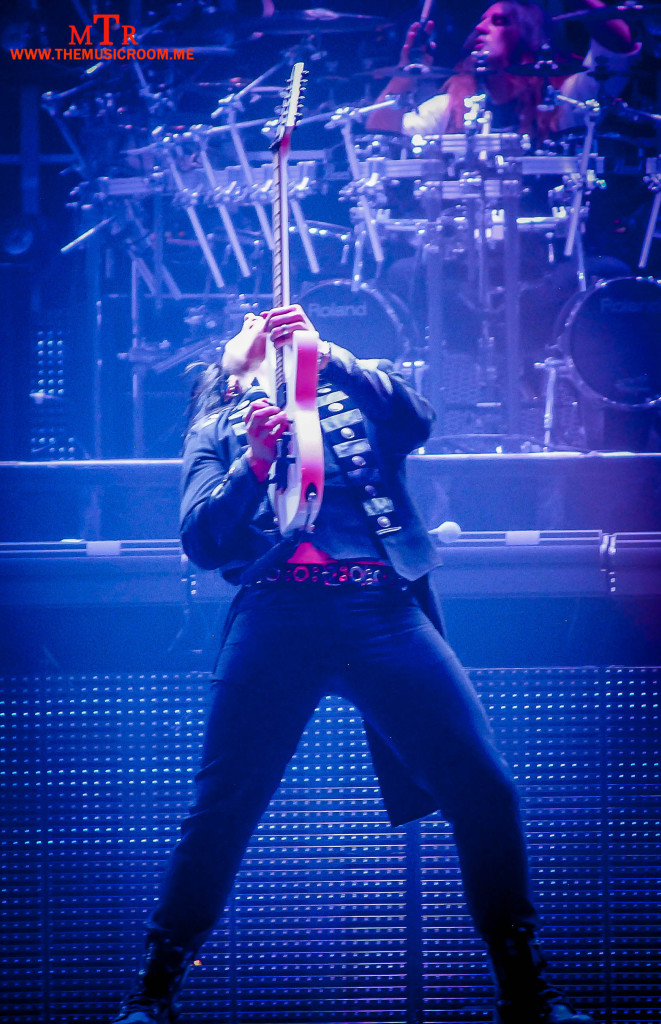
Megan Miller: Hi Paul.
Paul O’Neill: Hi Megan.
Megan Miller: You were talking about the technology and the pyro and all the special effects. Do you feel pressure to top yourself year after year and show after show?
Paul O’Neill: Yes. Every year we always say the same thing, “How the heck are we going to beat this?” Actually, a couple of our crew members used to work for Pink Floyd and one of them said, “Paul there is a reason why Pink Floyd toured like once every five years.” I’m discovering why. It’s a good problem to be having and it’s also one of the reasons why at the end of every tour we take quite a bit of the production and pretty much cut it up which forces us to have to come up with something new, something different. One year we had Greg Lake as a special guest. I love Greg Lake because Greg Lake is the guy who invented hard rock I mean from King Crimson and Emerson, Lake & Palmer and again I did Paul of course. He said, “Paul,” he goes, “you really get prog rock.” I’m like, “I’m afraid I have no idea what that means.” He said, “Prog rock is the ultimate form of music. If you’re in a blues band and you play jazz songs, it’s no longer a blues band. If you’re in a jazz band and you play reggae band it’s no longer a jazz band. If you’re reggae band and play Strauss waltz, it’s no longer reggae. But a progressive rock band you can do anything. It’s built into the name – progressive – you’re always pushing the envelope, which is why bands like Rush on the radio can go from rock to reggae and back to rock and nobody says boo. Also, with progressive rock bands like Emerson, Lake & Palmer, Pink Floyd, Genesis, progressive rock bands are not just expected to come up with great songs. Progressive rock is always expected to be pushing the live stage show. When I was kid growing up in New York City, basically there was four (indiscernible) on spotlights and you were on a roll. I’ll never forget the first time I saw Genesis when they invented the Vari-Lite which changed colors, moods. Everyone was like, “What the heck is that?” They didn’t just rent them they were involved in the design and financing it. It was Genesis I think that sparked the arms race of special effects on the stage. It basically helped take it to a different dimension. Just make sure that everybody in that arena gets to go to someplace where they normally couldn’t go.
Operator: Thank you. Our next question comes from Andy Gray with the Tribune Chronicle. Andy, you may go ahead with your question.
Andy Gray: Hi Paul.
Paul O’Neill: Andy, how you doing?
Andy Gray: I’m curious about was there anything about last year’s staging of Ghost of Christmas Eve that you weren’t happy with, or felt could be better that you kind of set out to tweak for this year’s presentation?
Paul O’Neill: God, the main thing always has always been – the hardest thing is to make the show this big and to keep the tickets between $25 and $70 and to make sure that they don’t get grabbed by the scalpers or the robots or whatever. Again, what’s the point of having a show like this if there only sovereign wealth funds or corporations or the latest and bankers from Wall Street could afford tickets? That has always been one of the big pressure things and that’s the other thing also to keep people from adding on fees and all these other kinds of things on it. We have our armies trying to get the best show at the cheapest price and there’s armies out there trying to grab the ticket price without adding anything to it. It’s a cat and mouse game. It’s the industry we entered and you do what you gotta do.
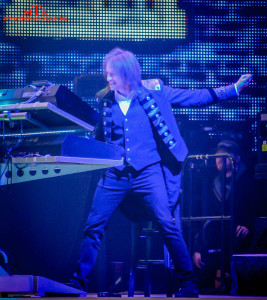
Operator: Thank you. Our next question comes from Matt Mattei from Times Leader. Matt you may go ahead with your question.
Matt Mattei: Hi Paul.
Paul O’Neill: Hi Matt, how you are, sir?
Matt Mattei: Pretty well, how are you?
Paul O’Neill: Okay.
Matt Mattei: One of the things that I’d like you to address. You talk about how you bring in new musicians on a frequent basis. This year you’ve already stated you’re excited about a new singer. Can you tell me what’s important about auditioning people all the time and bringing new life and talent into the group on a yearly basis?
Paul O’Neill: It’s multiple things. You need the old timers, you know, by that I mean Al Pitrelli who was from Alice Cooper, Asia and Megadeth, Jeff Scott Soto with Journey, Yngwie (indiscernible) is because they have literally decades of experience working the stage and working the audience. They help mentor the younger ones. The majority of the band is between 25 and 45. Basically it’s at the peak of their careers. We always make sure that we have a certain percentage between 18 and 25, the youngest we’ve ever had was Kayla who is 17. We literally found Kayla in the foster care system in Texas but she just had such a great voice that we decided we would take her out. It’s just been so great watching her turn from this shy young lady to this girl when she’s on that flight deck, she owns that flight deck. It’s just great watching her come into her own and start to soar.
We’re over 60 now. We’ve had our fun on the flight deck. I actually, in some ways, it’s more fun watching these kids taking it to another level and just also having the room and someone to tour support it. With the death of the label system, there’s so few chances for musicians to go out there and tour, especially in the big arenas. But when they join TSO all they just got to do is come to rehearsals, know their songs, get on the bus and then we’re off and running.
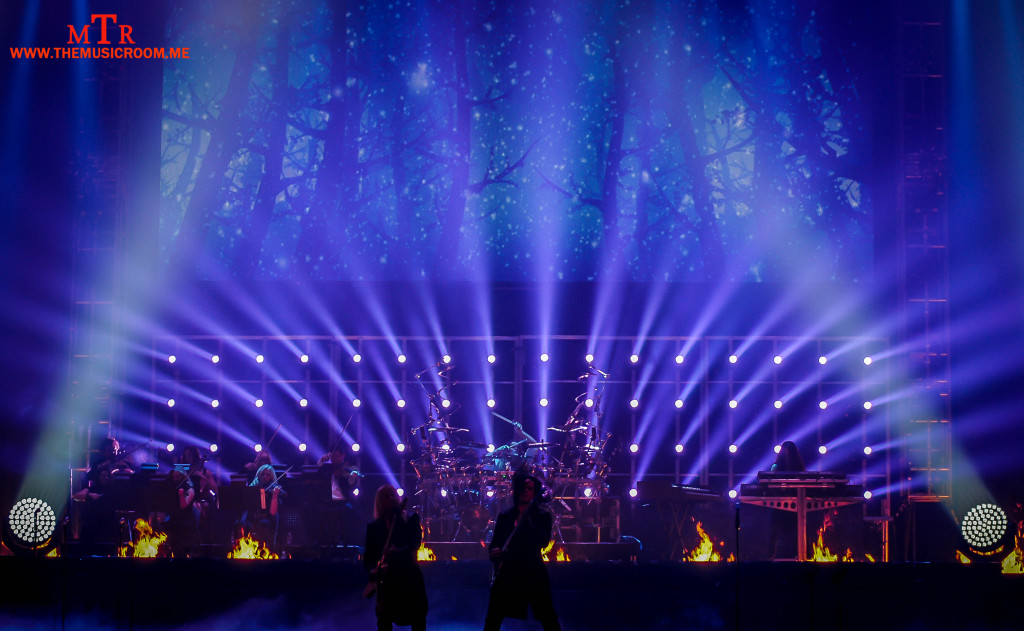
Operator: Thank you. Our next question comes from Melissa Ruggieri with the Atlanta Journal Constitution. Melissa, you may go ahead with your question.
Melissa Ruggieri: Hey Paul.
Paul O’Neill: Hi Melissa.
Melissa Ruggieri: Hey, listen you mentioned earlier a Broadway show. What can you tell us about that?
Paul O’Neill: Oh God. Growing up in New York City, I’ve always wanted to do Broadway. We have a couple of Broadway plays running, The Passion of the Fairytale Moon, Jesus on the Judas Night, but basically what happened was when TSO exploded and got so big so fast, the fact that we always just assumed that we would take one or two years off and do Broadway, but that has not occurred. It’s basically now has been after 20 years, I now feel like we have enough people in the band that understand the concept of the band and what we have to do, etc., that it’s time to let these people take the fleet out and I can go and try something new and something different. It’s something I’ve been dying to do. I love Broadway. I love to coherent storytelling of Broadway. The only thing about Broadway that I find is a negative is – I don’t know if a lot of you people go to Broadway – but most of the shows on Broadway if we went back 100 years in a time machine you could produce those plays and have them look exactly like they do now. You can go back ten years and produce a Trans-Siberian Orchestra show and have it look like it does now. The thing I do like about Broadway is it’s not as youth obsessed. You’ll see people like Michael Crawford, I think, who really broke to superstar in Phantom of the Opera when I think he was around 50. Rock basically once you leave your 20s, no label is going to give you a chance. Broadway basically allows you to use your age as a plus. As you get older, you lose a little of your high end, you pick up some baritone, but you can play other parts that you couldn’t. I wish I could say I could under my own, but when we did do the Ghost of Christmas Eve for the caretaker it was between two legends: Ossie Davis who was I do believe was in his 90s at the time, and Richard Harris, whom I always worshiped. When I was talking with Richard, we ended up going with Ossie Davis because he was older and it just worked out better schedule-wise. When I was talking to Richard because he’s a Shakespeare star and movie star of the 50s, the 60s, the 70s, the 80s and it was 1999 and he was doing Gladiators and Harry Potter. I said, “Mr. Harris, if you don’t mind my asking, why is it that you think your career has gone on so many decades and you’re still top of the bill?” He goes, “Paul, let me tell you my secret. When my agent sends me a script where me and my 18-year-old girlfriend save the world from chaos, I send it back and say, ‘Give me something where my age is a strength’,” which is why he plays the wizard in Harry Potter or he plays the dying Marcus Aurelius in Gladiator. That was a little pearl of wisdom that was just worth its weight in gold. Basically, I kind of like decided to eventually work in Broadway where you basically get to use a lot of artists that you wouldn’t be able to in rock.

Linda Tuccio-Koonz: Thank you. Hi Paul.
Paul O’Neill: Hi Linda. How are you?
Linda Tuccio-Koonz: Great, thanks. The show’s coming to Connecticut and I’m enjoying hearing you talk about how bands like Pink Floyd and Genesis have given you ideas for things that work in TSO. TSO is so big. Looking back at your high school days can you share any experiences you feel influenced or inspired your life today as creator of TSO?
Paul O’Neill: Yeah, actually by God’s good grace, I was able to actually share with the person that did it. When I went to see The Who at Madison Square Gardenin the late 60s, that I decided that I wanted to be a musician. Then I saw them a couple of years later. They come out and they opened up with Baba O’Riley and the place goes nuts. They do another song and the place goes nuts again. I tell all my friends, they peaked on the second song, where are they going to go from here? The third song they go even higher, then they go into this medley of I think Pinball Wizard and Behind Blue Eyes, and then with I Feel the Music. Madison Square Garden went so insane they literally drowned out The Who’s sound system. I got up to leave. My friend said, “Paul, are you okay?” I’m like, “No. They are so good, I can’t stand watching them.” I literally wandered around New York City literally depressed. Then about five years ago Roger came out and did three encores with us and I got to tell him that story. He thought it was funny.
Operator: Thank you. Our next question comes from William Kerns with Lubbock Avalanche Journal. William you may go ahead with your question.
William Kerns: Thanks, Lauden, that’s for talking with us, Paul.
Paul O’Neill: My pleasure, William.
William Kerns: This answer might seem easy, but what did it mean to you when you first realized that Team TSO has actually become a family tradition for so many. It certainly is here that it’s not just another concert where someone says, been there, seen that, I’ll think about, but everybody looks forward to seeing them every year.
Paul O’Neill: Again, never expected it. I always say it happens just I blame it on my mother because my parents had 10 kids, raised them all in New York City. Everybody else went to college. I didn’t. When I told them I was going into music, they were like, “No, go to college, get a real job and you do your hobby.” I just went into music anyway. I just think my mother was like, “Dear God, please don’t let this kid starve, don’t let this kid starve, don’t let this kid starve.” It worked out better than we ever could have imagined. It’s kind of scary but again, we just feel unbelievably lucky. We would have felt lucky, if the band had two or three platinum album and then had a good run. In the entertainment industry, Christmas is the Holy Grail because any other thing you’re writing about, whether it’s a painting, an album, a movie, a book, you’re competing with the best of your generation or the last two generations. When you can write about Christmas, you’re competing with the best of the last 2,000 years. If you’re a painter, it’s not Andy Warhol, it’s Bonacelli, it’s Michaelangelo. If it’s a book it’s Charles Dickens. If it’s a movie, it’s Frank Capra. If it’s music, forget it, it’s Beethoven, it’s Mendelssohn, it’s Irving Berlin. Again, when you’re writing anything for the Christmas season, you’re happy to get past the ultimate critic, the only critic you can’t fool, the only critic that counts 100 years from now which is time, because every century will only, it filters out what’s really, really, really good. That can be intimidating just into itself. Again, we just lucked out. There’s one other thing that was just very, very lucky for us. When TSO started to tour in 1999, there was a great schism in music when Les Paul and Leo Fender invented the electric guitar in ’49, and you either grew up pre-electric guitar, Perry Como, Dorsey Brothers or post-electric guitar – Elvis Presley and Chuck Berry. When we saw the turn basically even the grandparents were the Woodstock Generation. Basically everybody was familiar with rock which I think made it a lot easier for TSO to jump the generational divide than a lot of the bands that came before us.
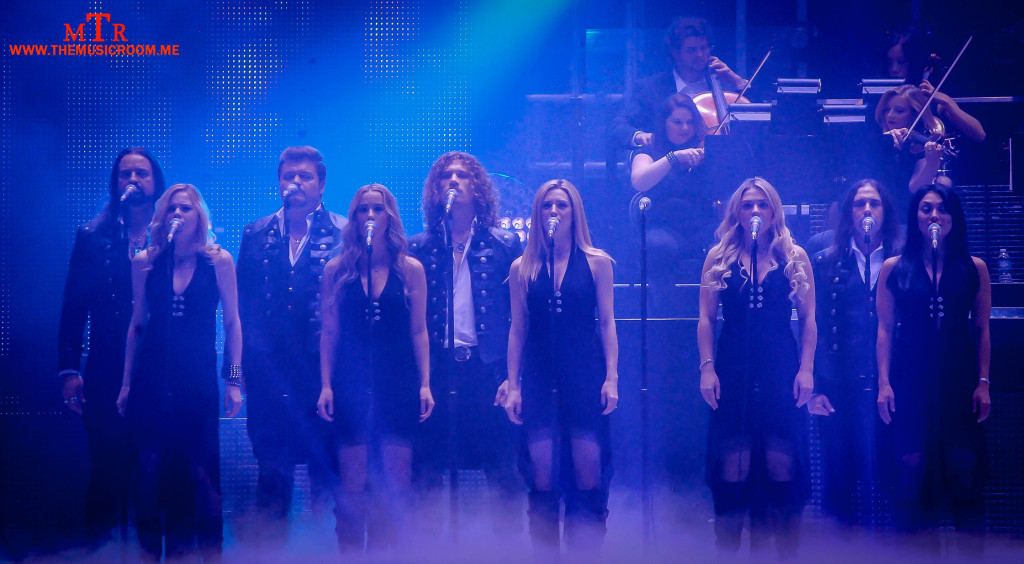
Operator: Thank you. Our next question comes from Vincent Harris with Greenville Journal. Vincent, you may go ahead with your question.
Vincent Harris: Hi Paul, how are you?
Vincent Harris: Very good, how you doing, sir?
Vincent Harris: Good, thanks for speaking with me. The main thing I wanted to ask you about, you talked about how you like bringing new things to the show each year, but I wondered when you go back to prepare these shows, are there new things that you’re finding in these works?
Paul O’Neill: Absolutely. You take songs like Christmas Canon when we recorded it in the studio we used a full child choir. I believe anybody under 18 should just spend it being a kid so we could never do that song live because I just don’t think it’s healthy for children to tour. I don’t even think it’s healthy for them to be in the Olympics at that age. I think childhood should be sacred and they should be wrapped in bubble wrap and play baseball in the local lot. With songs like that, Jennifer Cello was able to take and rock it out. We had a song, Music Box, which I wrote for a girl to sing with a plain voice, Darryl Pettiford from Kook & the Gang had this great whiskey just blues voice. He took the song to a whole other place. One of the great things about having rock musicians, people from the classical world, Julliard, people from Broadway is they’ll look at songs differently. I’ll have a classical cello player doing a riff and then the rock guitar player will take it and rock it out. The cello player is like, “What did he do to that?” Or the rock guy will be playing the riff and the cello player will add a classical element to it. It’s interesting because all the players are really at the top of their game. When you put them all together everybody’s game gets higher and everybody brings something to the table, even the newest ones, the new teenagers. They bring this unbridled enthusiasm that again, doesn’t allow any of them to become jaded. It just reminds us why we all got into this business in the first place.
Operator: Our next question comes Kendra Meinart with Green Bay Press-Gazette. Kendra, you may go ahead with your question.
Paul O’Neill: Hi Kendra, cool name by the way.
Kendra Meinart: Hi Paul, how are you?
Paul O’Neill: Very good.
Kendra Meinart: I’m wondering, when you look at the Trans-Siberian schedule on paper, it’s overwhelming. I can’t imagine what it must be like to pull off that schedule. Can you just talk a little bit about the logistics of keeping everybody that’s out on the road for those weeks comfortable, health and in top shape through the rigors of that tour?
Paul O’Neill: That is a great question. Well, number one, the band has 24 singers, that’s what we have in the winter because basically we want everyone to sing. We only do the winter rock operas during the holiday season. We won’t do them outside that time. Basically, no singer ever has to sing more than four songs in a night. I do that because when I was in the business in the 70s and the 80s, I would see so many bands, so many great singers destroy their voices. A doctor who was doing a node operation, that’s when you get a callous on your vocal cord. A friend of mine said, “Paul, your industry is insane.” I said, “What do you mean?” He said, “The human voice is not meant to scream on top of Marshalls for two hours a night. It’s not a matter of if you’re going to destroy these guys’ voices, it’s a matter of when.” When we were putting TSO together that’s when I decided we would have 24 lead singers because writing a great song is only half the battle. If you don’t have the right vocalist to do the alchemy to bring it to life and make it magic, you don’t have a song. Singers with great operatic voices, singers with whiskey dusk voices, singers, we always hopefully have the right singer for the right song. If we don’t, the band has another singer. Then another thing that I used to notice in rock, was a lot of times I would see a band have a great chorale section but when you see them live, they wouldn’t play it. We carry so many lead singers that whenever we have a song with a big chorale in it we can reproduce it because we have that many singers on the flight deck. When we tour we take brand new, the best buses that are available. Everybody has their own bedroom. We keep it all first class so basically they just have to be great for those two, three or four times they’re on the flight deck and the rest is just about keeping them comfortable, keeping them healthy. The other thing is, in TSO, we consider the crew band members because they’re the first ones in, the last ones out. They don’t get any of the glory but they’re basically out there making sure that all these people look and sound great for when they’re on the stage. In some ways, TSO has it a little bit easier than other bands. It’s kind of like being in a boxing match where I get to put in a new fighter in every round. Also, the singers learn from each other. It’s also interesting watching the different singers not to mention the different musicians cross-pollinating ideas. Occasionally Kendra, a singer will do something to a song, or a musician will do something that I couldn’t have imagined when I wrote it.
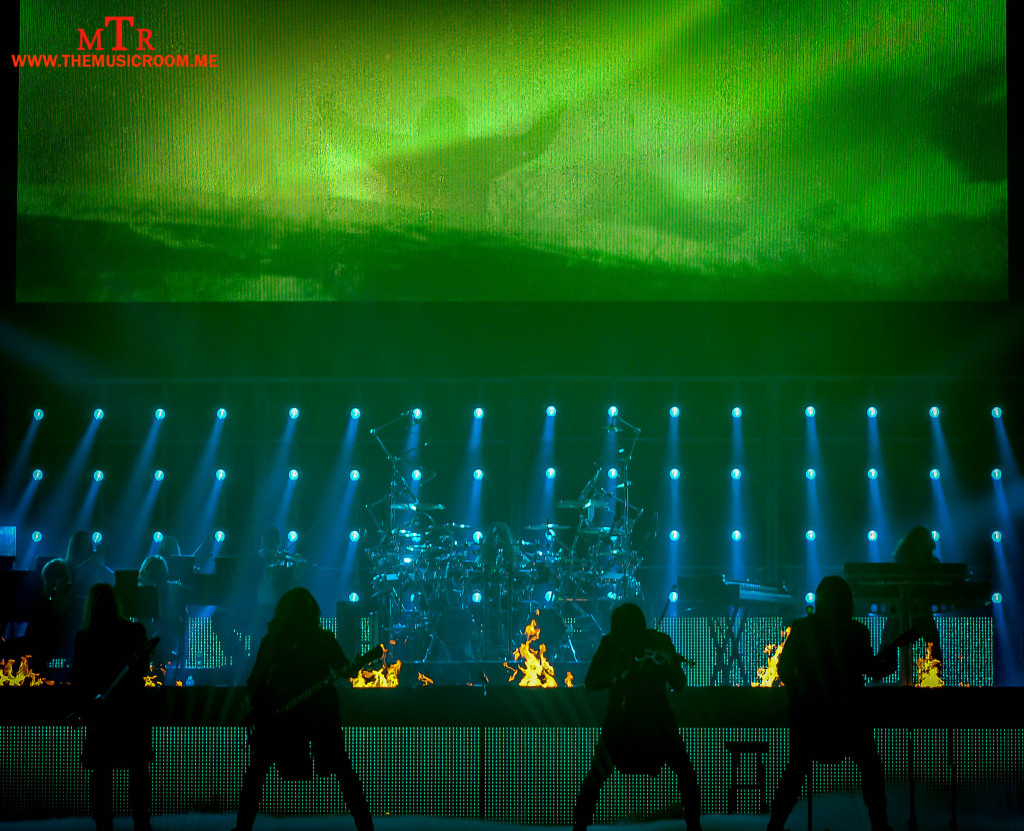
Operator: Thank you. Our next question comes Scott Mervis from Pittsburgh Post-Gazette. Scott, you may go ahead and ask your question.
Paul O’Neill: Hi, Scott.
Scott Mervis: Hi Paul. As you know, tribute bands are very prevalent right now especially the Pink Floyd ones, like Brit Floyd. I’m guessing maybe you’ve seen it. Are you aware that’s also a Trans-Siberian Orchestra tribute band called Wizards of Winter? I wanted to get your thoughts on them existing and whether you’re familiar with them.
Paul O’Neill: I think there’s like over 50 TSO cover bands now which is a little weird. Number one, it’s the ultimate flattery because when I was like 14, 15 I was playing Led Zeppelin and Who and never thought there would be a day when somebody would be playing our stuff. We just think it’s great that these kids are out there playing our music. Every once in a while we’ll touch bases and give them suggestions or this, that and the other thing. Honestly, it’s the ultimate compliment.
Operator: Thank you. Our next question comes from Charlotte Jacobson with Citizens Voice. Charlotte, you may go ahead with your question.
Charlotte Jacobson: Hi Paul.
Paul O’Neill: Hi Charlotte, how are you?
Charlotte Jacobson: Good, thanks how are you?
Paul O’Neill: So far so good. See, this is way easier than I thought.
Charlotte Jacobson: Well, that’s good. Earlier you were talking about how TSO kind of started backwards starting with Christmas rather than the other times of the year. Can you kind of talk about why you chose to focus on the Christmas story and like what was your initial goal with that?
Paul O’Neill: Well, again, I apologize to the few people on here that know this story already. Originally, it was 1993 when Atlantic signed TSO. The first rock opera was going to be Romanov and King’s First Whisper because the Soviet Union had just broken up and it was very timely. When William Morris heard it they said this is too good to be a rock album, this should go to Broadway and they sold it to Clear Channel which then became Live Nation. Atlantic was (indiscernible) because Clear Channel wanted the record rights back. When I went to Ahmet Ertegun and said, “Clear Channel wants to put this on Broadway but they want the records right back.” Atlantic had been paying for the record, Ahmet said, “If they want to put this on Broadway, go for it Paul and just bring us your next rock opera.” The original plan was to do six rock operas, a trilogy about Christmas and one or two regular albums. Ahmet said, “Why a trilogy about Christmas?” I said, “Besides all the musical influences, I’m very influenced by Charles Dickens and Oscar Wilde. Dickens wrote five books about Christmas and when one of your predecessors asked Charles Dickens why he wrote five books about Christmas, he said, ‘Christmas is too large a subject to take on in one book.’” I said, “Ahmet, too large for Dickens in one book, too large for me in one album and I’m going to break it into three.” I also said there’s two other reasons. I was always fascinated by Christmas by growing up in New York City is a business town. I noticed one of my earliest childhood memories, true story. I was coming home when I was like five with some of my friends, and we heard this screeching of brakes. We turned around, it’s Christmas Eve, it was just starting to snow and we see one Yellow cab slide into the back of another one, giving it a wallop in the back bumper. These two drivers get out. One looks like a longshoreman, the other one looks like he just got off a boat from some foreign country. Being little kids we were scared there was going to be a fight. Instead, the first driver goes, “This is completely my fault. I’m finishing my shift, I can pay for your bumper right now. You only have to work out the insurance.” The other guy looks at his bumper, and he goes, “You want to know something? I could have gotten this in any parking lot, don’t worry about it, keep your money.” The other guy goes, “No, I gotta pay for your bumper.” The guy is like, “I’m taking your money.” The next thing you know they’re looking at pictures of each other’s kids, they’re laughing. Five minutes later they drive their separate ways. Trust me, any other day of the year, blood on the street. Then you get a little older, you find out World War I, everyone stops fighting on Christmas Eve. World War II, everyone stops fighting on Christmas Eve. To me, the one side atheist, everyone stops fighting on Christmas Eve. I’m sure most of you guys know that very famous story in 1915, World War I, a truly brutal war in no man’s land. On Christmas Eve, one of the German soldiers started to sing Silent Night. A French soldier joined in from the other side and an Austrian soldier joined in from their side. The English soldier joined from the Allies. The next thing you know they’re all singing these songs and they all cross into No Man’s Land. They were exchanging gifts, tobacco, fruit, they played a soccer game which the Germans always point out they won. There’s something natural about this day where I just found it fascinating where it doesn’t just affect the way we treat each other on most individual levels, your neighbors, your family, the way nations and states treat each other. I was always just fascinated by that. Christmas Eve and other stories has the same effect all around the world. The Christmas Abacus House has been doing it for centuries and then the Lost Christmas Eve which wrapped it all up. There’s something about Christmas Eve and anyone who lives long enough is going to know somebody who hasn’t talked to a parent or friends or siblings in decades. There’s something about Christmas Eve that will make you pick up the phone and even in this day of Caller ID make the other side pick it up. You can’t even remember what you were fighting about. It basically allows you the opportunity undo mistakes you’ve made in your life that you didn’t think you could undo. I was always fascinated by that. It just seemed like something cool to write a story about.
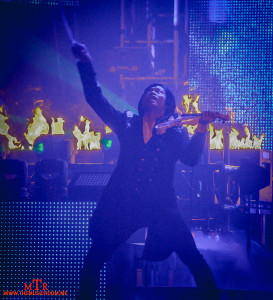
Operator: Thank you. Our next question comes from Jeff Wilkins with Schenectady Gazette. Jeff, you may go ahead with your question.
Jeff Wilkins: Hey Paul, greetings from upstate New York.
Paul O’Neill: Hey Jeff, I know I really love Schenectady because I love that name.
Jeff Wilkins: I love the Emerson, Lake & Palmer references. I’m wondering Paul, this time of year for the winter tour. What is TSO’s competition out there at that time of year? It’s a busy time of year, sometimes money is tight for a lot of people. Who are you guys competing against in the arenas and the stadiums? Part two of this question is, I know a lot of bands go out there and they say something along the lines of, “We want to play the hits the way the fans remember them.” Is there any room for improvisation in TSO, or is that against the TSO playbook?
Paul O’Neill: No. The TSO playbook is do whatever we think will get the arena to a higher level. Basically, we really don’t feel any sense of competition because basically our competition to us is ourselves. By that I mean that I don’t even know how to explain this. Number one, a lot of bands these days, like again the last time I went to the Madison Square Garden the front row was $3,000. Anybody can go see TSO and go see any other band that they want to see also. There should be no financial strain to come see this band. I get that from Disney and he’s someone that doesn’t get a lot of credit for TSO, but he deserves it. I’m a big fan of Disney. In the 1930s he was taking his daughters to an amusement park and it was ’30 and he saw kids wanting to go on the roller coasters and their parents saying they couldn’t afford it. He decided that one day he was going to build an amusement park that was so clean, so safe, so different that everybody would want to go to it. But once they paid off all the bankers, he was going to have just one ticket – and once you bought that ticket every ride was free. No parent would ever have to say to their kids, “We can’t afford to go on that.” No guy would have to say to his girlfriend, “We can’t afford that ride.” With Trans-Siberian Orchestra, we have the means if we have the show and we try to do it so if you want to go see the show, it’s not like when you go see Trans-Siberian Orchestra or this other band. It’s like, “Oh, we can see TSO and go see that other band.” We agonize to keep it affordable and that’s also one of the reasons why we do matinees also. Originally we only used to night shows. Then one day somebody one of the friends was in a country band and he said, “Oh my God, I’ve got to leave. I’ve got a 3 o’clock show.” I had never heard of a 3 o’clock show. In rock you just assume that everybody wakes up at 4:00 in the afternoon and goes to work at 8:00. There’s people that have to get up at 5:00 or take their kids to school. One year we decided to experiment in a couple of cities. We put matinees on and it works. We realized besides keeping the ticket affordable you have to make it easy for people to get there, fit it into their schedules.
As far as the competition, I think the competition is to just keep the show interesting enough that people want to come back to see it and enjoy the story over and over again, see what’s new that we add onto it. More importantly, it shouldn’t be a financial strain. Again, by the way, it was a great question that you just asked. When I was doing shows in the 60s, again the first time I saw The Who it was $5.00. I’ll never forget when I saw Led Zeppelin it was $7.50 and my friends were going, “$7.50? How can they justify this?” Tickets now have just, it’s insane. I mean you can get round trip flights to London cheaper than shows these days.
Operator: Thank you. Our next question comes Matt Reidl with Wichita Eagle. Matt, you may go ahead with your question.
Paul O’Neill: Hi Matt.
Matt Reidl: Hey Paul. I’ve just got a question. Your Christmas shows are always very popular here and one of our arena’s top sellers when you bring them to Wichita. I’m wondering, do you find that you have a group of core fans that come back every year, and if so, how do you try to keep the show fresh and accessible both to them, your old time fans and to new audiences, maybe people that have never seen the TSO before?
Paul O’Neill: We noticed it’s a mixture of both. There’s a lot of times where half the audience has been to the last ten shows, and half the audiences could be newbies. I love rookies. You can always tell rookies because I think when they go to the show and hear “orchestra” at the end of the name, they think it’s 50 people in folding chairs with 20 lights on or off. When the lights dim and this massive hard rock lighting system starts to assemble itself, they realize wow, this is going to be something different and the roller coaster is off. The more we can blow their minds, the more I enjoy it. Again, the whole trick is just always when they think that they’ve seen the ultimate trick, you have five more in your back pocket. The most important part of the show is basically those five minutes right after the show where they’re leaving. Again, we joke with each other, we don’t want them to say that was a good show, or that was a great show, or that was the best show they ever saw. We want them to say, “Man, we just ripped that band off line.” Also something else we’ve noticed. We try to put so much action between the front stage, the back stage, the walks and everything else going on that it’s not unusual for us to see somebody in one city and then see them the next day in the next city because they drove 300 miles to see the next show. We take that as an ultimate compliment. Again, the key is never to get complacent, never to forget that the people that own this band are the fans and the minute we forget that is the minute the band starts to decline. Again, that’s true for corporations, that’s true for governments, that’s true for anyone. Again, we just feel really, really lucky that we get make our living doing this instead of being stuck in a cubicle making widgets.
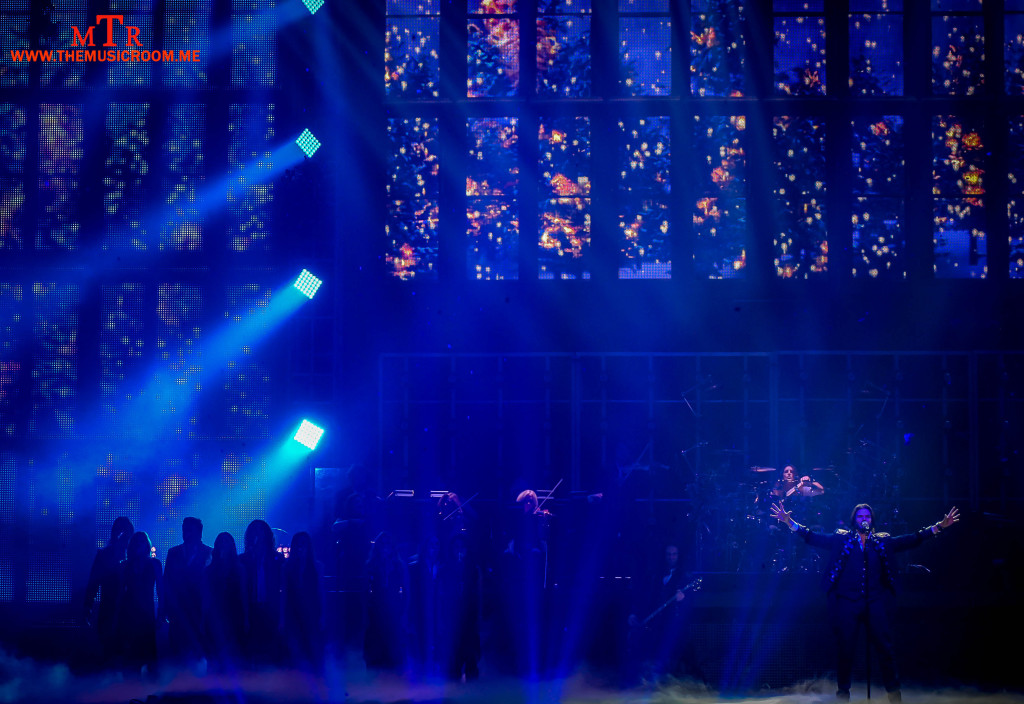
Operator: Thank you. Our next question comes from Caroline Hafer with Community Journals. Caroline, you may go ahead with your question.
Caroline Hafer: Hey Paul, how are you?
Paul O’Neill: I’m fine Caroline, how are you?
Caroline Hafer: I’m good. You said earlier that you kind of have to meter this desire to one-up those previous shows. Do you have a specific moment in your career that was like you couldn’t really believe that you pulled it off, or just one moment to think about here as far as technology or pyro or some other aspect of the show?
Paul O’Neill: Probably Berlin, 1914, close to two. In 1914 (indiscernible), we had a call from the City of Berlin asking us if we could play Brandenburg Square on New Year’s Eve, but we had two shows that day in Buffalo. Basically we had to rent a bunch of jets. Oh, and Lee Moore said, “Paul you can’t do it because you’ve only got two hours of buffer time and if you hit bad winds or a storm, you’re not going to make it.” But the chance to play Brandenburg Gate and they said it was going to be like as many as a half a million people there. I said, “We gotta do it.” Lee Moore said, “You can do it next year.” I said, “But if they don’t ask us next year.” W. Solsin who is like a genius of logistics, he put together the situation. We did the show in Buffalo, went right to the airport jumped on the plane. They took us right to Brandenburg Square. There was way over a million people there and we made the show with 15 minutes to spare. Then the second one, which was a rush for us, was summer of 2015 where Wacken is the biggest festivals in Europe. You guys know Wacken festivals where they have two headline stages right next to each other so when one band’s playing the other band is setting up. They asked us if we would take one the headline spots and we simply said we didn’t have the time. They said what if we gave you both headline stages at the same time. I went like, “You have my undivided attention.” Basically we became the first band in history to play a stage that was close to, it was over two football fields long. It was just great because in the beginning the first five songs we just used the one stage and then for the sixth song we turned the second stage on and you could just see the shock in the audience’s face. It was a blast. I was just really glad we did that. Those are definitely the two highlights.
Caroline Hafer: Thank you. Paul can you clarify that year for Brandenburg?
Paul O’Neill: Brandenburg was 2014, and Wacken was 2015.
Operator: Thank you. We will now take our next question from John Katic from Iron City Rocks. John, you may go ahead with your question.
John Kadik: Thanks Hi Paul.
Paul O’Neill: Hi John, by the way I love the name of your publication?
John Kadik: Thank you. A question for you. Obviously routing this tour has got to be challenging with the limited amount of time to capture the Christmas audience. Has any consideration been given to try to get in the industry where bands are going to the high definition IMAX theater films?
Paul O’Neill: No, because there’s a magic to live that you simply can’t replace. I’ve always thought live was important. You can see an orchid open up in an IMAX theater, but if you see one open up in a rain forest it’s way more magical. Also, when you’re playing live in such an arena where you have 20,000 people around you, you pick up the energy of the person in front of you, to the right of you, to the left of you and there’s a rush to you. The other thing with the Trans-Siberian Orchestra, it’s also like why it’s more important than it’s ever been before because when I was kid growing up, basically rock had not a lot of competition. You had baseball, football, pinball, not too many things. For television stations, now you’ve got video games, X-Box, Play Station. It’s so much harder to keep up with kids, 1,000 television stations. In some ways I think it’s unhealthy. Human Beings are social animals by nature. I read a paper a couple of years ago where it said in the 70s and the 80s the average kid spent 14-1/2 hours a week outside playing with other children. Now the average kid spends 45 minutes a week. If they play football, it’s on a video screen. If they play baseball, it’s on a video screen and its spread to adults. My favorite of course is Farmville where you plant imaginary carrots in imaginary dirt and you do imaginary rabbits. It’s even hit the adult world. When I was kids when the parents would come home they would go coach Little League, they would go to Rotary Club, they would get together with their neighbors. Now, their (indiscernible), simulated city, just people don’t get together as much.
The other great thing it’s also one of the reasons why we agonize to keep the tickets so affordable. When I would go to see bands when I was younger, the guy on your right his father could have been David Rockefeller, the guy on the left his father could have been a maintenance worker, the guy in front of you, his father could have been on unemployment but it didn’t matter. You were all there just loving this great concert and everybody was enjoying it at the same time. I’d mentioned this to a couple of you guys that we talked about before, the last show I saw at the Garden I found it so depressing because now in the first 20 rows in the thousands of dollars but they were pretty much empty. It wasn’t because they weren’t sold, it was because corporations had bought them as perks for their clients and those people were in the bars making deals and the band’s biggest fans, the ones that should have been closest were relegated to the back. To me, the one great thing about rock is just this one thing that makes everybody equal and that everybody loved together. Where the richest guy in the world could hear Bohemian Rhapsody come on and get a smile on his face and turn it up on his radio. He could be sitting in a 1963 Impala and the guy next to him in a Mercedes could smile and give him a thumbs up. That’s the magic of music. You seem to be heard not just in indoor concerts but even in the festivals. I forget which festival it was recently where you had certain people in the front and then you had people on the side in swimming pools with air conditioning. To me that’s just kind of takes a little bit of rock’s edge away.

